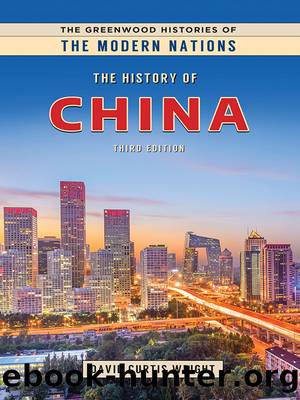The History of China: Third Edition by David Curtis Wright

Author:David Curtis Wright
Language: eng
Format: epub
Publisher: ABC-CLIO, LLC
Published: 2020-11-15T00:00:00+00:00
8
Dengâs China
News of the arrest of the Gang of Four was greeted with widespread jubilation in China, not so much because the Chinese people knew a great deal about each member but because it seemed to portend a final stop to the endless and exhausting mass movements that Mao and the radicals so loved to promote. In the summer of 1977, all four members were expelled from the party, and meanwhile Deng Xiaoping was making a comeback. In early 1977, he was allowed to return to Beijing, and he quickly emerged as the partyâs dominant personality, effectively shunting Hua Guofeng aside. It simply did not matter anymore that Mao had apparently designated Hua as his successor; people were fed up with Mao and his antics. Deng was soon leading the charge against the radicals and moved, along with the fellow moderate Hu Yaobang, to purge the party of its extremists. The pendulum had swung the other way, and now the radicals who had joined the party during the heady days of the Cultural Revolution were subject to summary expulsion. Deng and his supporters then launched an enormously popular program of reform in China.
Deng detested the personality cult that Mao and his devotees had fostered, and he quickly dismantled it. Huge statues of Mao were pulled down all over China, and Deng rejected all attempts to create a similar personality cult around himself. Deng wanted to change China, but he would do it from behind the scenes, without the heroically high profile of Chairman Mao, the Great Helmsman. In August 1977, Deng stated in a major party speech that Mao had actually made mistakes. On this occasion he also propounded the famous principle âseek truth from factsâ (which was originally a methodological and epistemological approach taken by Qing philologists). By this he meant that the Chinese Communists should henceforth be less concerned about ideological purity and doctrinal rigidity and be more flexible and pragmatic in their thinking: whatever worked was good, and whatever did not was bad. Dengâs star was rising, and by the end of the year he and his fellow moderates Hu Yaobang and Zhao Ziyang had been admitted to the Politburo. Deng, labeled a capitalist roader during the Cultural Revolution, was now emerging as Chinaâs preeminent leader. Political developments turned on a dime in the Peopleâs Republic.
To the relief of Chinaâs population, Deng announced that there would be no more mass movements and that the nation would henceforth concentrate on building its economy and improving the lives of its citizens. Deng allowed, even encouraged, individual enterprise and found nothing wrong with material incentives. Diehard conservative Communists stewed about his restoration of âcapitalismâ in China, but their day was now gone and they could do nothing about it but rant among themselves. Deng was doing for China what Mao would never doâproviding a peaceful, orderly environment in which stable economic development could take place. To the relief of hundreds of millions of peasants, the last vestiges of the communes and agricultural cooperatives were disbanded in the countryside in the early 1980s.
Download
This site does not store any files on its server. We only index and link to content provided by other sites. Please contact the content providers to delete copyright contents if any and email us, we'll remove relevant links or contents immediately.
| Africa | Americas |
| Arctic & Antarctica | Asia |
| Australia & Oceania | Europe |
| Middle East | Russia |
| United States | World |
| Ancient Civilizations | Military |
| Historical Study & Educational Resources |
The Dawn of Everything by David Graeber & David Wengrow(1707)
The Bomber Mafia by Malcolm Gladwell(1625)
Facing the Mountain by Daniel James Brown(1553)
Submerged Prehistory by Benjamin Jonathan; & Clive Bonsall & Catriona Pickard & Anders Fischer(1455)
Wandering in Strange Lands by Morgan Jerkins(1430)
Tip Top by Bill James(1416)
Driving While Brown: Sheriff Joe Arpaio Versus the Latino Resistance by Terry Greene Sterling & Jude Joffe-Block(1376)
Red Roulette : An Insider's Story of Wealth, Power, Corruption, and Vengeance in Today's China (9781982156176) by Shum Desmond(1359)
Evil Geniuses: The Unmaking of America: A Recent History by Kurt Andersen(1354)
The Way of Fire and Ice: The Living Tradition of Norse Paganism by Ryan Smith(1336)
American Kompromat by Craig Unger(1315)
F*cking History by The Captain(1304)
It Was All a Lie by Stuart Stevens;(1300)
American Dreams by Unknown(1286)
Treasure Islands: Tax Havens and the Men who Stole the World by Nicholas Shaxson(1274)
Evil Geniuses by Kurt Andersen(1257)
White House Inc. by Dan Alexander(1212)
The First Conspiracy by Brad Meltzer & Josh Mensch(1174)
The Fifteen Biggest Lies about the Economy: And Everything Else the Right Doesn't Want You to Know about Taxes, Jobs, and Corporate America by Joshua Holland(1126)
